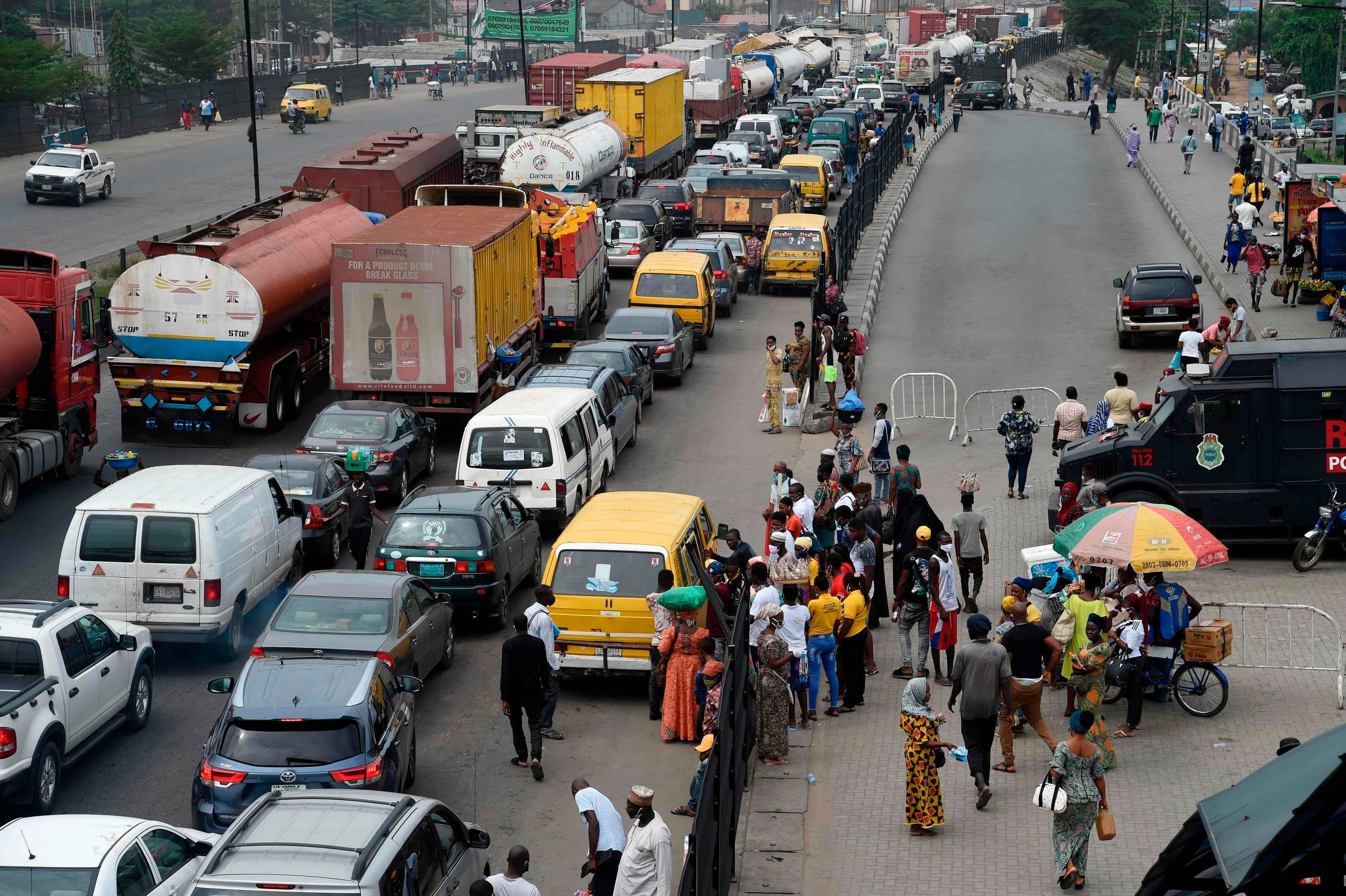‘You cannot expect compliance’: Social distancing rules stretched to breaking point as Africa’s largest city returns to work
Lagos reopens its packed bus network to commuters after a five-week national lockdown, despite rising Covid-19 case numbers and warnings from WHO

People in Lagos, Nigeria’s largest city and the epicentre of its coronavirus outbreak, started heading back to work this week after a 35-day lockdown, even as the numbers of new cases did not appear to be tailing off.
The World Health Organisation warned on Thursday that if Covid-19 cannot be contained in Africa it will claim the lives of up to 190,000 people by the end of the year, a figure that the WHO’s regional director for Africa, Matshidiso Moeti, said she hoped would spur the strongest action across the continent.
But for people in its most populous metropolis and one of the most crowded cities in the world, social distancing has proved to be a challenging task – one that is only going to get more difficult as workers return to commuting on packed public transport or visiting cheek-by-jowl urban markets.
A ban on large gatherings and religious centres is still in place, and there is a curfew between 8pm and 6am. People are also required to wear face masks in public, offices must shut by 3pm and buses have been told to maintain social distancing by keeping to no more than 60 per cent of capacity.
That last requirement in particular seems a tall order. Lagos, with a population of 22 million, sees more than 20 million trips made daily on the state-owned bus rapid transport (BRT) system, where large buses take between 40 and 85 people, and yellow minivans (danfo) are usually 14 to 18 person seaters.
A lack of buses means commuters race to get on board, and predictably this week, the rules forbidding groups of more than 20 to gather and stipulating individuals remain two metres apart have been ignored as large groups wait by the roadside.
Things are also only going to get worse – the first commuters to return have been the urban poor who cannot work from home and rely on casual jobs to provide their lean incomes. Only a few offices have opened in Lagos, with businesses sticking to work-from-home orders where possible.
Ifeoluwa Ayanniran, a digital marketer, told The Independent his office reopened on Monday – something he called the “wrong choice”. Huge surge pricing on taxi-hailing apps like Uber meant he had no choice but to use a bus, spending hours at a packed terminal before huddling onto one.
“[There’s] basically nothing like social distancing at the bus stops and even inside the bus,” he said. “People were rushing to enter a few available buses because there was traffic and the spacing inside the bus is inconsequential.”
Even those travelling much greater distances to get into the city found their commute packed. Olumide Moradeyo said he used an intercity bus to get from his home bordering Ogun State to his office in Apapa, Lagos, a journey of some 270km.
He said the bus was filled well above the mandated 60 per cent of capacity, but was resigned to the fact it would be packed. “You know Lagos is really congested and the fact is, you cannot expect total compliance of the social distancing orders in a place like Lagos.”
Alice Richard, a trader at the popular Mile 2 market, shared a similar story of a reality in violation of the government’s orders, and said bus operators were making good money charging a premium. “Our vehicle was well loaded and they are collecting a huge amount from us,” she said.
Health experts have expressed concerns about even a limited reopening of Nigerian cities, even as the country recorded its highest number of new cases in a single day – 381 on Thursday, taking the total past 3,500 infections and more than 100 deaths.
The Nigerian Medical Association president, Francis Faduyile, said the move was “very premature” and that the country risks driving up the rate of infections.
Chike Ihekweazu, head of the Nigeria Centre for Disease Control (NCDC) said: “If we do have that new explosion [of cases], there would be almost no choice for the leadership of the country than to ask everybody to go back into our homes.”
Yet even staying at home has proved a challenge for many in the lockdown since 30 March. It is estimated that nearly seven out of 10 Lagosians live in slum communities and informal settlements with dense populations making effective social distancing impossible.
And Lagos is not the only major Nigerian city struggling to comply with lockdown rules. In the capital city of Abuja, widely shared social media posts showed hundreds gathered in packed crowds outside bank branches, opening for the first time after weeks where people had to rely on ATM withdrawals, internet transactions – or the kindness of friends and family.
Speaking on the phone from Abuja, Tosin Kolawole suggested things had improved since Monday as “some banks found a way of managing it by providing seats under a shade, and it is well-spaced so people go into the bank batch by batch”.
“But it is still not safe, because you do not know the health status of the last person that sat on the chair,” she added.
Join our commenting forum
Join thought-provoking conversations, follow other Independent readers and see their replies
Comments